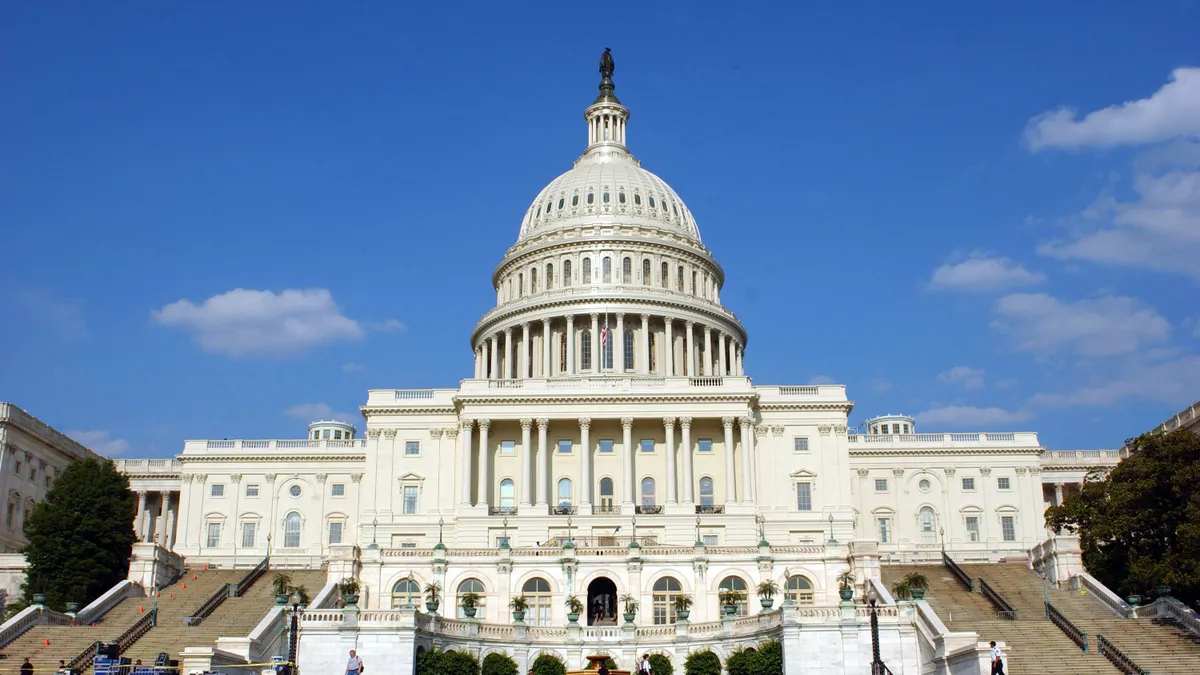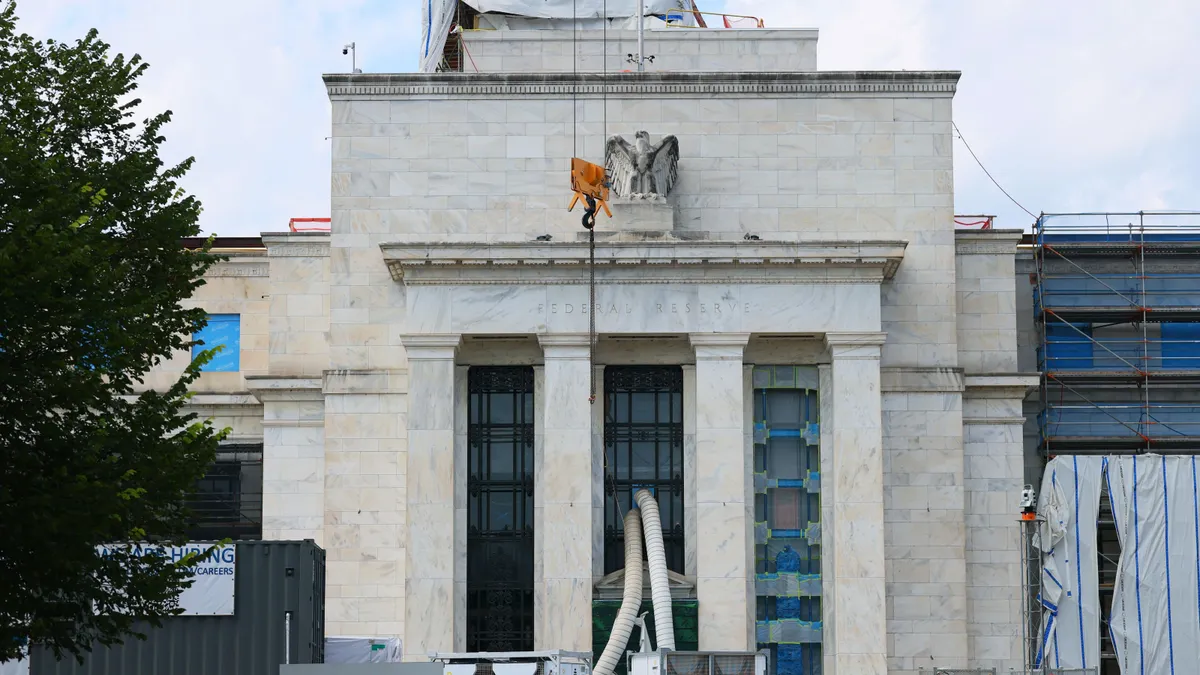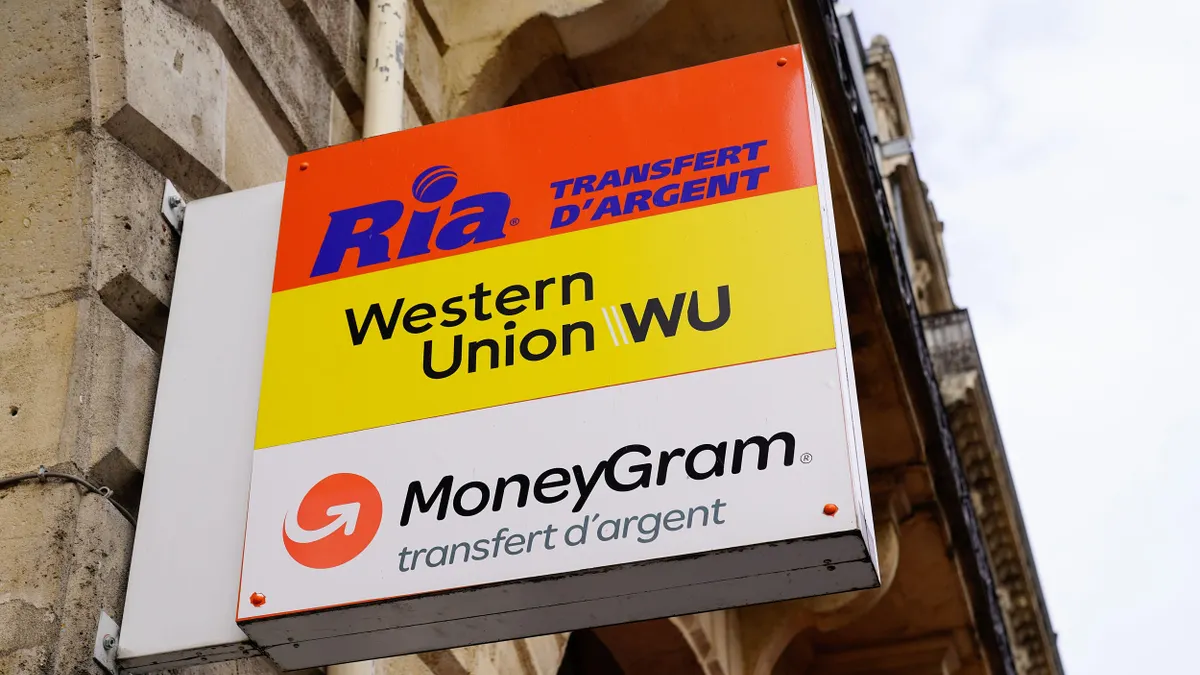The Senate is expected to reconvene next week for more work before the holiday break, but Sen. Roger Marshall says he doesn’t expect to push the Credit Card Competition Act bill through Congress this year.
While the House adjourned Thursday, Senate leaders called on members to return next week and continue work on large legislative packages related to immigration and aid for embattled Ukraine and Israel.
Nonetheless, Marshall doesn’t seem to think any of that legislation will offer a vehicle for moving the CCCA bill across the finish line this year, he suggested in an interview Thursday.
“People here can smell the jet fumes — they’ve got one foot in a taxicab headed to the airport and one on the steps of the Capitol,” Marshall said in describing the Senate winding down its business Thursday. “I don’t see any way it’s going to happen right now. I think we’re not going to get much more done after tonight.”
For much of the year, the Kansas Republican has locked arms with Sen. Dick Durbin, an Illinois Democrat, to push the bill to a vote, even if that meant attaching it to a bigger piece of legislation, like the defense funding bill or the cannabis banking bill known as the Safer Banking Act proposal.
Their key aim with the CCCA proposal is to direct more competition at Visa, the largest U.S. credit card network, and No. 2 Mastercard. If enacted, the law would do that by requiring big banks that issue credit cards to ensure there is at least one alternative network available to merchants for processing credit card transactions that isn’t Visa or Mastercard.
“We thought that that was a perfect opportunity,” Marshall said of the Safer Banking proposal. “And then we thought there might be some appropriations bills come to the floor, but unfortunately, (Senate Majority Leader) Chuck Schumer wants to wait and do some huge omnibus at the last moment, and it just makes it next to impossible to get an amendment on a bill. So we’re still waiting for that perfect opportunity.”
A spokesperson for Durbin didn’t immediately respond to a request for comment.
Even though the CCCA sponsors have sought to bypass a committee hearing, if necessary, to fast track the bill to the Senate floor for a vote, it’s not for lack of trying to get the attention of the Senate Committee on Banking, Housing and Urban Affairs. “We begged the Banking committee to give us a hearing, which would seem very reasonable,” Marshall said.
The Senate sponsors contend the act would reduce interchange fees merchants pay to card issuers and the networks every time a consumer swipes a credit card to make a purchase. They have also said they believe that merchants would pass those savings on to consumers.
Just because he’s thrown in the towel for this year doesn’t mean Marshall is giving up on pushing the proposal through during this congressional session, which runs through the end of 2024. “I think we've got the votes,” the senator said. “I really think that if we get this to the Senate floor we have the votes to pass it because it's the right thing to do,” Marshall said.
That’s despite politics typically being even more complicated in an election year like 2024. “It's hard for me to predict exactly what's going to happen in an election year, but I'll tell you this much: We've worked hard,” Marshall said. “We've especially worked hard at the staff level, educating people (as to) what this means to their own hometowns, to their home states.”
Retail trade groups such as the National Retail Federation and the Merchants Payments Coalition have backed the legislation on behalf of convenience store chains and big box retailers as well as smaller local retail businesses. Meanwhile, the banking associations and their interest groups, such as the Electronic Payments Coalition, have opposed the legislation, arguing that the merchants would pocket any savings for themselves. They also say the fees pay for important services, like cybersecurity.
“Supporters of this bill have been promising a vote this year to their political allies, donors and members for months,” EPC Executive Chairman Richard Hunt said by email, via a spokesperson. “They’ve tried attaching this bill to a totally unrelated, must-pass piece of legislation – like funding for our veterans and troops - and Congress said ‘no.’”
While the bill has bipartisan backing in both chambers, the power of the banks may be reflected in the small number of listed sponsors for the bill, with three in the Senate and seven in the House.
“The banks have a very powerful lobby,” Marshall said. “They're very influential up here. So, I think for the most part, senators would like to keep their heads down and live to fight another day,” he said. “We'll see what we can do about getting some more co-sponsors, but, really, I think the challenge is just getting a vote on the floor and we'll be just fine.”
Marshall argues the industry is essentially controlled by four major banks and two card networks extracting $90 billion annually from merchants. JPMorgan Chase, the largest U.S. bank, and Capital One are two of the largest card issuers.
Those four banks are collecting 85% to 90% of the profits and extracting “exorbitant rates,” he said. The act would “level the playing field,” he said.
If enacted, the law would apply only to bank card issuers with more than $100 billion in assets.
“There's not a bank in Kansas that's going to be impacted by this,” he said, noting that only about 32 U.S. banks would be affected by the law.
The bipartisan Senate duo has argued that current practices are an additional expense for Americans in a period of high inflation. The 2% to 4% fee contributes to “crushing hard-working American families,” Marshall said. Marshall asserts the U.S. fees are higher than those paid by counterparts in Europe, Canada or China.
Still, complaints in Kansas driving his campaign for the CCCA come from merchants, such as hoteliers and convenience store operators, more than from consumers, he said.
“They tell me they're paying more for their swipe fees than they do for utilities or for their employees’ health insurance,” the senator said of merchants in Kansas. “So I think that's where the biggest, loudest complaints come from.” Meanwhile, for consumers it’s a hidden cost and “they don’t even realize it's happening to them, for the most part,” he said.
This issue is “really Wall Street versus Main Street,” Marshall said. “Most senators in an election year are going to choose Main Street.”






















